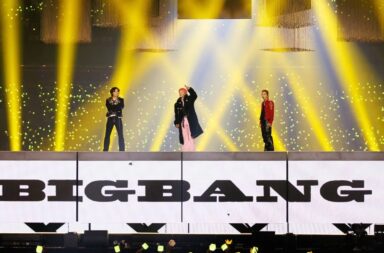As I watched Big Bang on Gold Miss Diary I couldn’t help but wonder why 10 minutes of a half-hour show is spent guessing the women’s ages. This is one of the things that I can’t stand about Korean variety shows, this obsession with youth and the jeering at older women or older men by the younger of the opposite sex. I couldn’t put my finger on it before, exactly what irked me even while I laughed at the antics on Korean shows, but I seem to be laying my finger on it. Everything seems to be looked at through the lens of how much of a man or a woman you are through the eyes of the opposite sex. So when all of Big Bang guesses how old the women are it’s kind of like going through who’s dateable/doable and who’s not. And likewise, when, say, a member of SNSD guesses the age of an Oppa or ajussi like Yoo Jae Suk and Kim Soo Ro, it’s like saying where they stand with these girls.
After the age-guessing bit of Gold Miss they go into “If you go back 10, no, 15 years, who would you approach first?” Once again, we see this idea that a woman is only as good as the man that will have her and vice-versa.
A lot of Korean variety shows are this way and it’s not just romanticizing courtship. The fact that three male idols guessing women’s ages is funny and worthy of 1/3 of a variety show, to me, is ridiculous but it says a lot about a countries social culture and how they interact with one another. I’m sure, in reality, grown women in Korea aren’t so hung up on what 19 year-old guys think about them. But the younger set, the demographic for these types of shows, are still learning something.
In the show X-Man there’s the couple portion of the show. You were the King Ka if you were a hot member of Shinhwa (or some such idol group) and you were the Queen Ka if you snagged one of them during the couple selection. And inversely if you got, say, Chae Yeon, you were the man. In Loveletter, which completely revolves around courtship and acceptance and rejection from the opposite sex, the same thing applies. In Family Outing, for no reason at all, the girls assign where the men will sleep and the men assign where the women will sleep in order of who they like the most/who is the most desirable. There is no reason to do this, but it takes up a good 15 -20 minutes in some episodes. This process of watching people being chosen and rejected is entertainment and where you end up determines how much you’re worth.
I’m still mulling this over as I have a distant knowledge of the workings of Korean culture and I’m learning increasingly more about it as I delve deeper into it’s culture, popular and otherwise. But what I see is an infatuation, almost to an unnerving degree (Lolita complex), with youth, the insistence that you are what the person next to you makes you and the entertainment that is derived from these assertions.
Is this particular to Korea? Or is this just a magnified reflection of what all people in all types of societies go through? Either way, the transformation of this into entertainment deeply interests me. What do you think?
Crossposted at: NYCSeoulTokyo



